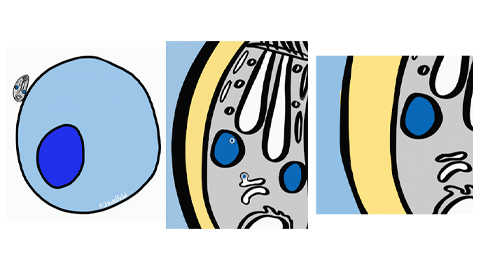Yang follows the science
where it takes her
Yue (Cindy) Yang grew up in a university environment in her home country of China, and from a young age she pictured herself as a professor at a university. Her father is a mechanical engineering professor and her mother is a dentist, and both helped inspire her to seek a life of science, though her inspiration is also internal.
The 2020 JBC Herbert Tabor Early Career Investigator Award winners will present their work at the 2021 ASBMB Annual Meeting, 1:45–3 p.m., Tuesday, April 27.
Find out about registering for the annual meeting here.
“I’ve always loved science,” Yang said, “especially biology.”

After earning a bachelor’s degree from the Chinese University in Hong Kong, Yang wasted no time in continuing her education and moved to the U.S. to get her master’s. She chose the University of Nebraska so she could study with Ji-Young Lee in the nutritional sciences department. Yang was drawn to the lab’s astaxanthin work, and she enjoyed Lee’s mentorship so much that when Lee moved to the University of Connecticut, Yang followed, joining the Ph.D. program there and continuing her work in the lab.
During her Ph.D., Yang studied the health effects of astaxanthin, an antioxidant carotenoid compound found in algae. She thrived in the lab, loving the freedom to follow the science.
“Sometimes you go into a lab and everything is established, and you just follow and do what everyone has been doing,” she said. “But when I was in Dr. Lee’s lab, we’d have to find what the next step is and decide for ourselves what to do. It was a great experience.”
She took these skills into her postdoctoral fellowship at Weill Cornell Medicine, where she studies NAD+ metabolism in Anthony Sauve’s lab and recently was promoted to instructor. That young girl who always saw herself as a professor seems to be well on her way, following where the science takes her.
A new pathway to increase cellular NAD+
Cindy Yang finds the work in Anthony Sauve’s lab incredibly exciting. The innovative and collaborative environment in the lab allows her to dive deep into the NAD+ field with all its nuance and potential to improve human health.
The job of NAD+ is to transfer a hydrogen from one molecule to another. This central activity means that NAD+ is a cofactor for over 500 enzymatic reactions in the cell and is essential to life. Researchers now see that modulating cellular NAD+ levels can have wide-ranging effects in the cell and in the whole body, such as preventing metabolic syndrome and neurodegeneration; it may even slow aging in general. This has inspired many clinical trials and patents, but with typical compounds that increase NAD+ in the cell, the dosage required to see any effect is extremely high.
Yang and her colleagues discovered that a new compound, dihydronicotinamide riboside, or NRH, increases NAD+ levels in cultured cells to an unprecedented level with a lower dose and in as little as an hour. NRH also appears to act as a precursor to NAD+ through a novel pathway. While a novel pathway means a lot of work must be done to find out what exactly is happening in the cells, this new work is opening the door to increasing our understanding of NAD+ metabolism and its effects on human health and may lead to efficient modulation of NAD+ in the clinic.
You can read Yang’s JBC/Tabor prize-winning paper here.
Enjoy reading ASBMB Today?
Become a member to receive the print edition four times a year and the digital edition monthly.
Learn moreGet the latest from ASBMB Today
Enter your email address, and we’ll send you a weekly email with recent articles, interviews and more.
Latest in People
People highlights or most popular articles

Sketching, scribbling and scicomm
Graduate student Ari Paiz describes how her love of science and art blend to make her an effective science communicator.

Embrace your neurodivergence and flourish in college
This guide offers practical advice on setting yourself up for success — learn how to leverage campus resources, work with professors and embrace your strengths.

Survival tools for a neurodivergent brain in academia
Working in academia is hard, and being neurodivergent makes it harder. Here are a few tools that may help, from a Ph.D. student with ADHD.

Quieting the static: Building inclusive STEM classrooms
Christin Monroe, an assistant professor of chemistry at Landmark College, offers practical tips to help educators make their classrooms more accessible to neurodivergent scientists.

Hidden strengths of an autistic scientist
Navigating the world of scientific research as an autistic scientist comes with unique challenges —microaggressions, communication hurdles and the constant pressure to conform to social norms, postbaccalaureate student Taylor Stolberg writes.

Richard Silverman to speak at ASBMB 2025
Richard Silverman and Melissa Moore are the featured speakers at the ASBMB annual meeting to be held April 12-15 in Chicago.

